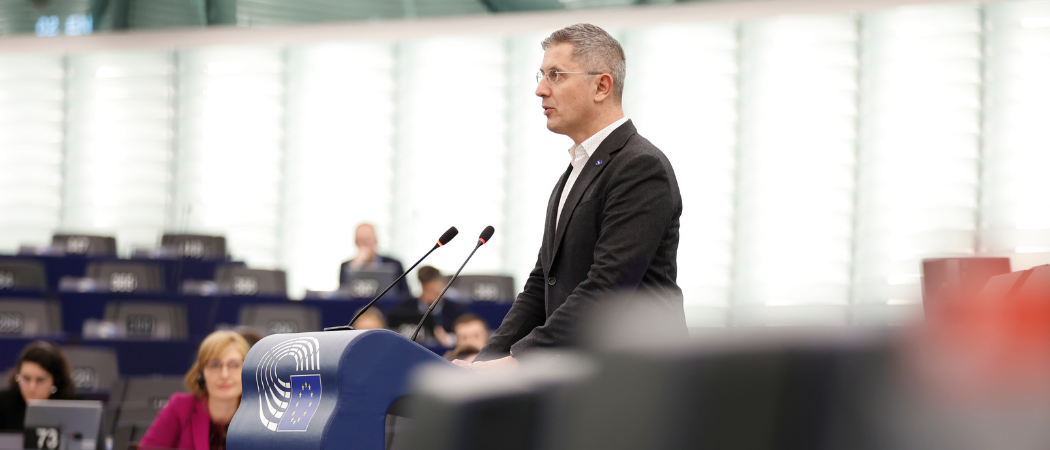The Commission should make more money available for disgruntled US researchers

Renew MEP Dan Barna speaking at a plenary session in Strasbourg. Photo credits: Mathieu Cugnot / European Union
Many MEPs have called on the Commission to increase efforts to attract US scientists affected by budget cuts and political interference in academia and research. They see the current geopolitical context as a chance for the EU to present itself as an international beacon for academic freedom.
European research organisations and funding agencies have already started to mobilise by creating programmes and opening positions dedicated to scientists whose work is threatened by Donald Trump’s restrictive policies, such as freezing billions of dollars in research funding and censoring research fields like health, climate change and gender.
But MEPs say the EU could do more. In a plenary session with EU research commissioner Ekaterina Zaharieva on Monday evening, they said that the Commission should make more money available for disgruntled researchers who are willing to relocate.
Zaharieva went to speak in the Strasbourg plenary amid mounting transatlantic tensions. This week, the Commission is getting ready to respond to a flurry of tariffs that the Trump administration is planning to impose on EU goods and services.
MEPs Christophe Grudler with Renew and Adrián Vázquez Lázara from the European People’s Party underlined the need to offer greater financing for researchers willing to relocate and, ultimately, reinforce scientific research in the EU.
Grudler pointed out that Trump’s attacks on science were not just financial; they are also “ideological.” Left MEP Mario Furore also noted that political interference in science happened in lot of countries that are not necessarily authoritarian regimes. Science is being “held hostage to ideology,” he said.
But other MEPS had even harsher words for the impact of Trump’s policies on science. “Europe is now the only most powerful guardian of freedom, while the current US administration tries to experiment with Inquisition 2.0,” Renew MEP Dan Barna said. However, he emphasised that Europe’s ongoing asylum initiatives for scientists were insufficient.
Meanwhile, far-right groups in the Parliament echoed ideas from the Trump playbook. For MEP Malika Sorel of Patriots for Europe, there are two symmetrical attacks on academic freedom: “On the one hand, the wokeism and the political correctness that has prevailed for decades, including in our countries and on the other, a reactionary movement that intends to cut off research organisations on the pretext that they have been able to make a pact with wokeism.”
The way forward
Zaharieva has reiterated her willingness to make Europe “a safe place” for international researchers and scholars worldwide, including those suffering from Donald Trump’s attacks on academic freedom. “We cannot afford complacency,” she told MEPs. “This global landscape is an opportunity to show the world that Europe will remain a safe space for science and research.”
At a time when “scientists worldwide are increasingly instrumentalised,” Zaharieva said that the European Commission would enshrine freedom of scientific research into EU law, in line with a Parliament resolution dated January 2024.
However, the commissioner believes that the EU should not close the door on pursuing cooperation with the US, maintaining an approach that is both pragmatic and in line with EU interests. Science can help build bridges “even when politics sees walls,” she said.
Last month, 13 governments urged Zaharieva in a letter to help provide options for US-based researchers to pursue their work in Europe in the face of massive layoffs, grant cancellations and topic censorship in academia. Among their recommendations, they asked her to mobilise funding through existing EU schemes.
In addition to the mechanisms that the EU executive hopes to mobilise to support both European and international researchers, like the Marie Sklodowska Curie Actions Choose Europe initiative and a doubling in the relocation allowance for grants of the European Research Council, Zaharieva said that a new visa strategy would be developed later this year.
The European Research Council (ERC) is doubling the relocation allowance it makes to researchers coming to the EU to take up one of its grants. At present it offers third-country researchers up to €1 million to cover eligible start-up costs in their new European host institution; this will now rise to €2 million.





 A unique international forum for public research organisations and companies to connect their external engagement with strategic interests around their R&D system.
A unique international forum for public research organisations and companies to connect their external engagement with strategic interests around their R&D system.